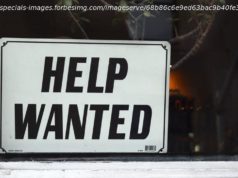Representatives for the U. S. and China have set „targets“ for a potential pact, but there is no guarantee it will get signed.
A trade agreement between China and the United States including possible tariff reductions started to take shape during talks in Washington this week, a senior administration official told CNBC on Friday.
Representatives for the world’s two largest economies have set „targets“ for a potential pact after two days of negotiations, but there is no guarantee it will get signed, said the person who declined to be named. The sides are talking about cutting tariffs in sectors including energy and farming, among others.
On Thursday, Trump attended an Oval Office meeting with Chinese Vice Premier Liu He and top U. S. officials as Beijing and Washington try to reduce trade tensions and fears of a possible trade war. The president’s presence indicates the meetings are going well, and he pushed Liu to expand the list of sectors that could see tariff reductions, according to the official. Trump brought up areas including energy and natural gas.
On Friday, Trump’s chief economic advisor Larry Kudlow told reporters the negotiations „are going well.“ He said Trump „was probably more optimistic yesterday on the subject than I’ve seen him in this whole process.“
„China’s come to trade, they’re meeting many of our demands,“ Kudlow said. „There’s no deal yet, to be sure, and it’s going to probably take a while. It’s a process. But they’re coming to play. I believe they want to make a deal.“
The economic advisor said he does not think there is a deadline to reach a deal.
While the Trump administration considers alleged intellectual property theft by Chinese companies a critical issue, the representatives have not resolved the problem yet, according to the senior administration official who declined to be named.
One provision on the table is revising the rules for American ownership of Chinese firms in sectors such as financial services. A proposed measure would bring the cap on ownership of a company from 45 percent now to 55 percent in three years and 100 percent at a point in the future, the official said.
No more meetings were slated to take place among high-level officials as of late Friday afternoon, the person added. Lower level negotiators were still discussing details at the Treasury Department.
In addition, Trump’s China hawk trade advisor Peter Navarro attended the Oval Office meeting, according to Kudlow. He participated despite news reports that he had been excluded from the talks.
Earlier Friday, China’s Foreign Minister denied that it proposed to cut its trade surplus with the U. S. by $200 billion, as reported by some news outlets. Trump has repeatedly argued that China takes advantage of the U. S. because China sends significantly more goods to America than the U. S. sends back.
Kudlow said he wants to see „at least $200 billion“ cut from the U. S. trade deficit with China. He insisted on Beijing lowering both tariff rates and non-tariff barriers.
Some free-trade lawmakers and market watchers hope the talks will avoid escalating tariffs and a potential trade war. On Thursday, Trump said he doubts the negotiations with China will succeed.
„Will that be successful? I tend to doubt it,“ the president said. „The reason I doubt it is because China has become very spoiled. The European Union has become very spoiled. Other countries have become very spoiled, because they always got 100 percent of whatever they wanted from the United States.“
Trump has proposed tariffs on $50 billion worth of Chinese goods such as electronics and machinery in response to alleged intellectual property theft. He floated additional tariffs on $100 billion in other Chinese products.
China floated retaliatory measures on U. S. goods such as crops and aircraft. The possible Chinese tariffs sparked concerns about damage to the U. S. agricultural industry.
Chinese telecommunications company ZTE has also factored into the negotiations. Reports have suggested Trump could consider a deal in which the U. S. would lift a ban on American companies selling to ZTE in exchange for China scrapping some tariffs on agricultural products.
The ban on ZTE came in response to the company’s shipping of American goods to Iran and North Korea in violation of sanctions. It effectively crippled the firm.
On Friday, Kudlow said ZTE is „not a real trade issue“ but rather a „legal enforcement issue.“ That depiction contradicts Trump, who called the policy on ZTE part of a „larger trade deal.“
Asked about the apparent discrepancy, Kudlow said „I think he sees it in the bigger picture, sure, as his relationship with President Xi.“






